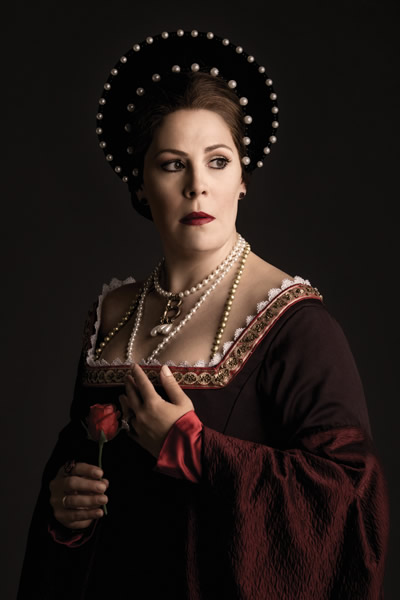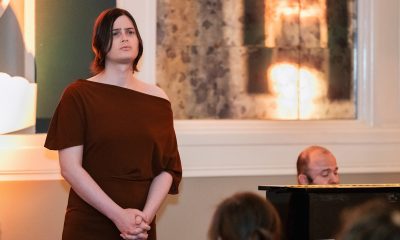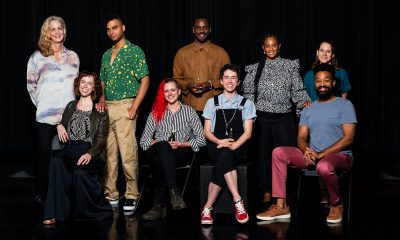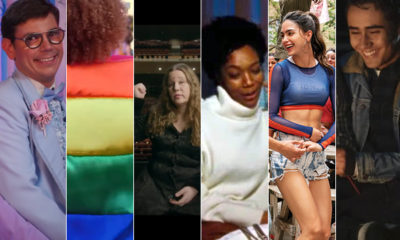Arts & Entertainment
Of queens and minions
Washington National Opera features high-stakes and high-jinks in new season
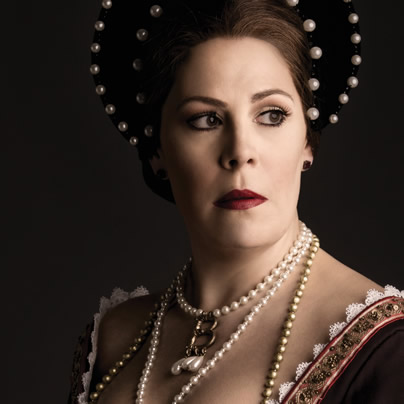
‘Anna Bolena’
Washington National Opera
Sept. 15-Oct. 6
‘Don Giovanni’
Sept. 20-Oct. 13
Kennedy Center
2700 F St., NW
$25-$300
202-467-4600
kennedy-center.org
From epic royals to legendary libertines, Washington National Opera’s 2012-2013 season openers are a perfect fit for capital city audiences mired in a presidential election year.
First out of the gate is Gaetano Donizetti’s “Anna Bolena,” opening Sept. 14. Starring soprano Sondra Radvanovsky in the title role, the 19th-century opera follows the waning days of Anne Boleyn’s reign as Queen of England before being found guilty of adultery and beheaded.
“The opera is amazing dramatically,” says Radvanovsky, “and the music on top of it is just any soprano’s dream.”
Radvanovsky made a name for herself in the dramatic soprano repertoire of Giuseppe Verdi, but in recent years, she started branching out to explore other roles. Often compared to renowned soprano Maria Callas, who revived “Anna Bolena” from near obscurity in the 1950s, Radvanovsky’s voice possess a full-blooded timbre that’s matched by a riveting acting sense, according to her director for this production, Stephen Lawless.
“The intelligence which she brings to the playing of Anna is thrilling and moving,” says Lawless, who’s gay. “She always puts her abilities to the service of the job in hand.”
The opera culminates in a heartbreaking and defiant mad scene for Anna, yet both Lawless and Radvanovsky feel this isn’t the garden-variety hysteria portrayed in other operas, including the same composer’s calling card “Lucia di Lammermoor.”
“She’s emotionally naked,” Radvanovsky says of the queen. “The easy card to put down is to play cuckoo-for-Cocoa-Puffs. Anna Bolena isn’t crazy; it’s just too much for her to handle, and I think that’s something that more people can relate to.”
“She finds inner resources that I suspect she never knew she had,” Lawless says about the doomed queen, adding that her death transforms tragedy into “something glorious.”
DESPITE THE TUDOR-ERA setting for the story, the opera’s themes bear striking relevance to today’s social and political climate. Donizetti contrasts Anna’s undoing with the ascendency of the social-climbing Jane Seymour, who has caught the eye of Henry VIII and will become queen after Anna’s decapitation. However, Anna’s betrayal of a true love from girlhood haunts her throughout out the story, reminding Jane Seymour and audiences that dreams of power can’t buy happiness.
“I started singing when I was 11,” says Radvanovsky. “When I was 18 years old, I said, ‘By the time, I’m 30, I’m going to be singing at the Met.’” This dream came true for the singer, as did her chance to sing with legendary tenor Placido Domingo. She sang with him during “Cyrano de Bergerac” on her 35th birthday, causing her to ask the older legend what she should do now that she’d accomplished her goals.
“He told me, ‘Oh, Sondra. You must go get a new dream.’”
Now in her 40s, Radvanovsky feels that anyone, from the American people trying to choose a president to a young girl aspiring to be queen of 16th-century England, needs to focus on the moment at hand instead of an unpredictable future.
“If [Anna] had lived in the moment, she would have seen that she wasn’t in love with [Henry], but she was looking a year ahead. We are looking into politics in the same way. We put so much hope in these dreams, hoping that Obama or whoever continues down the road we want.”
Lawless, a British native, sees the opera’s connection to today’s audience in a slightly darker hue, recounting how Russian President Vladimir Putin visited the United Kingdom during the recent Olympics. While there, he was asked about Pussy Riot, the female punk band who staged a protest act against Putin weeks before his recent election to the presidency.
“He said, ‘I hope the courts will be lenient with her,’” remembers Lawless, “and that’s exactly a Henry [VIII] statement. It’s that kind of abuse of power that gives this piece its ironic resonance. Henry’s abuse of power should make you as angry as the Pussy Riot thing.”
WASHINGTON NATIONAL OPERA’S next piece, Mozart’s “Don Giovanni,” follows close on the heels of “Anna Bolena” and opens Sept. 20. The infamous womanizer of the title gets his karmic comeuppance by opera’s end, attended throughout by his long-suffering servant, Leporello, played by gay bass-baritone Andrew Foster-Williams.
“I have played it once before, where he was very dark,” he says of the character. “I’ve since come to realize that’s not right. It needs to be multi-layered. We need to remember that it’s a ‘dramma giocoso’ — a dark comedy.”
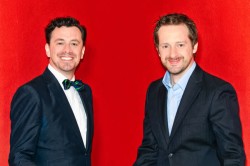
Paul (left) and Andrew Foster-Williams. Andrew plays Leporello in Washington National Opera’s production of Mozart’s ‘Don Giovanni.’ (Photo courtesy WNO)
The singer travels the world with his partner, photographer Paul Foster-Williams, who grew into an avid opera devotee because of his 14-year relationship with Andrew.
“I didn’t come from an opera background,” Paul says. “Now, I would do anything to go and see opera. It gives you the most returns in any art form.”
Paul compares opera with baseball, a realization he came to after going to see a Nationals game while staying in D.C. last spring for Andrew’s turn in “Werther.”
“I had no idea what was going on,” Paul says, laughing. “If you go to the football or soccer game and you don’t know the rules, you might not ever go to another game. It’s the same with opera. The more you experience, the more you get it, the more you will be come absolutely addicted to it, I promise.”
“The reasons people enjoy baseball is because they understand the rules,” Andrew adds. “They learned the rules, therefore they understand the skill of the players.”
The charming British couple hastens to add that opera is performed with translation surtitles projected above the stage, so no one need sit through hours of unintelligible bellowing.
THE FOSTER-WILLIAMSES are clearly a couple who have their own rules down pat. They say they’ve had to develop particular ways of living a life that’s eternally on the road.
“We land in a place,” says Paul. “Andrew goes out and gets provisions. I try to make the apartment feel like a home. We don’t speak to each other at least for a couple of hours.”
“If you’re going to have an argument, it’s then,” Andrew concurs.
“I think some people would end up killing each other,” says Paul. “We’re very lucky. Other people go to separate jobs, and they have separate things to share. What we’re sharing is the discovery of different places together.”
Some productions settle them in a city for a couple of months, while others find them hopping four continents in one week, as it did last spring. After finishing up in D.C., they went to London, Hong Kong and finally Sydney, Australia, which was locked in the grips of winter.
“We had to buy new clothes and leave some new clothes,” Andrew says.
Despite the chaos, the couple remains passionately committed to the arts. Paul’s photography has had to take on a new character, as long-term projects are out of the question now, so he ends up photographing the artists Andrew works with as well as the city locations Paul explores during his partner’s long rehearsal hours.
“Experiencing so much music traveling with Andrew, I think I understand singers well. Singers adapt to each evening, each audience, the atmosphere that evening. It’s so organic, it’s so alive all the time.”
Andrew sums up the role of the artist as an obligation to restoring the humanity to operatic characters.
“This is about making opera real again. The fate of it rests in the hands of the artists singing it.”
Out & About
The Rare Book Fair is coming to D.C.
Over 35 antiquarian booksellers from across the country to attend

The Capital Rare Book Fair will bring more than 35 antiquarian booksellers from across the country to D.C. from Friday, May 3 to Sunday, May 5 at the historic University Club at 1135 16th St., N.W.
This year, the fair will take over two floors in the illustrious mansion on 16th Street and showcase thousands of beautiful, notable, and rare books, maps, and historic documents from around the globe. Exceptional examples that will be offered include leaf 27 of a 40-leaf xylographic Biblia pauperum, a picture Bible from 1465 for $85,000 from Bruce McKittrick Rare Books, among many other intriguing selections.
Tickets are $50 and more information is available on the event’s website.

Friday, April 19
Center Aging Friday Tea Time will be at 2 p.m. on Zoom. This is a social hour for older LGBTQ adults. Guests are encouraged to bring a beverage of choice. For more information, email [email protected].
Go Gay DC will host “Drag Pageant” at 8 p.m. at Freddie’s Beach Bar and Restaurant. Net proceeds from this event will benefit EQUALITY NoVa, the local nonprofit organization dedicated to advancing equality in Northern Virginia. Attendance is free and more details are available on Eventbrite.
Saturday, April 20
LGBTQ People of Color Support Group will be at 1 p.m. on Zoom. This peer support group is an outlet for LGBTQ People of Color to come together and talk about anything affecting them in a space that strives to be safe and judgment free. For more details, visit thedccenter.org/poc or facebook.com/centerpoc.
Go Gay DC will host “LGBTQ+ Brunch” at 11 a.m. at Freddie’s Beach Bar & Restaurant. This fun weekly event brings the DMV area LGBTQ community, including allies, together for delicious food and conversation. Attendance is free and more details are available on Eventbrite.
Sunday, April 21
Go Gay DC will host “LGBTQ+ Dinner” at 7 p.m. at Federico Ristorante Italiano. Attendance is free and more details are available on Eventbrite.
AfroCode DC will be at 4 p.m. at Decades DC. This event will be an experience of non-stop music, dancing, and good vibes and a crossover of genres and a fusion of cultures. Tickets cost $40 and can be purchased on Eventbrite.
Monday, April 22
Center Aging: Monday Coffee & Conversation will be at 10 a.m. on Zoom. This is a social hour for older LGBTQ adults. Guests are encouraged to bring a beverage of their choice. For more details, email [email protected].
Tuesday, April 23
Pride on the Patio Events will host “LGBTQ Social Mixer” at 5:30 p.m. at Showroom. Dress is casual, fancy, or comfortable. Guests are encouraged to bring their most authentic self to chat, laugh, and get a little crazy. Admission is free and more details are on Eventbrite.
Genderqueer DC will be at 7 p.m. on Zoom. This is a support group for people who identify outside of the gender binary. Whether you’re bigender, agender, genderfluid, or just know that you’re not 100% cis. For more details, visit genderqueerdc.org or Facebook.
Wednesday, April 24
Job Club will be at 6 p.m. on Zoom. This is a weekly job support program to help job entrants and seekers, including the long-term unemployed, improve self-confidence, motivation, resilience and productivity for effective job searches and networking — allowing participants to move away from being merely “applicants” toward being “candidates.” For more information, email [email protected] or visit [email protected].
Asexual and Aromantic Group will be at 7 p.m. on Zoom. This is a space where people who are questioning this aspect of their identity or those who identify as asexual and/or aromantic can come together, share stories and experiences, and discuss various topics. For more details, email [email protected].
Thursday, April 25
The DC Center’s Fresh Produce Program will be held all day at the DC Center for the LGBT Community. People will be informed on Wednesday at 5:00 pm if they are picked to receive a produce box. No proof of residency or income is required. For more information, email [email protected] or call 202-682-2245.
Virtual Yoga with Charles M. will be at 7 p.m. on Zoom. This is a free weekly class focusing on yoga, breath work, and meditation. For more details, visit the DC Center for the LGBT Community’s website.
Movies
After 25 years, a forgotten queer classic reemerges in 4K glory
Screwball rom-com ‘I Think I Do’ finds new appreciation

In 2024, with queer-themed entertainment available on demand via any number of streaming services, it’s sometimes easy to forget that such content was once very hard to find.
It wasn’t all that long ago, really. Even in the post-Stonewall ‘70s and ‘80s, movies or shows – especially those in the mainstream – that dared to feature queer characters, much less tell their stories, were branded from the outset as “controversial.” It has been a difficult, winding road to bring on-screen queer storytelling into the light of day – despite the outrage and protest from bigots that, depressingly, still continues to rear its ugly head against any effort to normalize queer existence in the wider culture.
There’s still a long way to go, of course, but it’s important to acknowledge how far we’ve come – and to recognize the efforts of those who have fought against the tide to pave the way. After all, progress doesn’t happen in a vacuum, and if not for the queer artists who have hustled to bring their projects to fruition over the years, we would still be getting queer-coded characters as comedy relief or tragic victims from an industry bent on protecting its bottom line by playing to the middle, instead of the (mostly) authentic queer-friendly narratives that grace our screens today.
The list of such queer storytellers includes names that have become familiar over the years, pioneers of the “Queer New Wave” of the ‘90s like Todd Haynes, Gus Van Sant, Gregg Araki, or Bruce LaBruce, whose work at various levels of the indie and “underground” queer cinema movement attracted enough attention – and, inevitably, notoriety – to make them known, at least by reputation, to most audiences within the community today.
But for every “Poison” or “The Living End” or “Hustler White,” there are dozens of other not-so-well-remembered queer films from the era; mostly screened at LGBTQ film festivals like LA’s Outfest or San Francisco’s Frameline, they might have experienced a flurry of interest and the occasional accolade, or even a brief commercial release on a handful of screens, before slipping away into fading memory. In the days before streaming, the options were limited for such titles; home video distribution was a costly proposition, especially when there was no guarantee of a built-in audience, so most of them disappeared into a kind of cinematic limbo – from which, thankfully, they are beginning to be rediscovered.
Consider, for instance, “I Think I Do,” the 1998 screwball romantic comedy by writer/director Brian Sloan that was screened last week – in a newly restored 4K print undertaken by Strand Releasing – in Brooklyn as the Closing Night Selection of NewFest’s “Queering the Canon” series. It’s a film that features the late trans actor and activist Alexis Arquette in a starring, pre-transition role, as well as now-mature gay heartthrob Tuc Watkins and out queer actor Guillermo Diaz in supporting turns, but for over two decades has been considered as little more than a footnote in the filmographies of these and the other performers in its ensemble cast. It deserves to be seen as much more than that, and thanks to a resurgence of interest in the queer cinema renaissance from younger film buffs in the community, it’s finally getting that chance.
Set among a circle of friends and classmates at Washington, D.C.’s George Washington University, it’s a comedic – yet heartfelt and nuanced – story of love left unrequited and unresolved between two roommates, openly gay Bob (Arquette) and seemingly straight Brendan (Christian Maelen), whose relationship in college comes to an ugly and humiliating end at a Valentine’s Day party before graduation. A few years later, the gang is reunited for the wedding of Carol (Luna Lauren Vélez) and Matt (Jamie Harrold), who have been a couple since the old days. Bob, now a TV writer engaged to a handsome soap opera star (Watkins), is the “maid” of honor, while old gal pals Beth (Maddie Corman) and Sarah (Marianne Hagan), show up to fill out the bridal party and pursue their own romantic interests. When another old friend, Eric (Diaz), shows up with Brendan unexpectedly in tow, it sparks a behind-the-scenes scenario for the events of the wedding, in which Bob is once again thrust into his old crush’s orbit and confronted with lingering feelings that might put his current romance into question – especially since the years between appear to have led Brendan to a new understanding about his own sexuality.
In many ways, it’s a film with the unmistakable stamp of its time and provenance, a low-budget affair shot at least partly under borderline “guerilla filmmaking” conditions and marked by a certain “collegiate” sensibility that results in more than a few instances of aggressively clever dialogue and a storytelling agenda that is perhaps a bit too heavily packed. Yet at the same time, these rough edges give it a raw, DIY quality that not only makes any perceived sloppiness forgivable, but provides a kind of “outsider” vibe that it wears like a badge of honor. Add to this a collection of likable performances – including Arquette, in a winning turn that gets us easily invested in the story, and Maelen, whose DeNiro-ish looks and barely concealed sensitivity make him swoon-worthy while cementing the palpable chemistry between them – and Sloan’s 25-year-old blend of classic Hollywood rom-com and raunchy ‘90s sex farce reveals itself to be a charming, wiser-than-expected piece of entertainment, with an admirable amount of compassion and empathy for even its most stereotypical characters – like Watkins’ soap star, a walking trope of vainglorious celebrity made more fully human than appearances would suggest by the actor’s honest, emotionally intelligent performance – that leaves no doubt its heart is in the right place.
Sloan, remarking about it today, confirms that his intention was always to make a movie that was more than just frothy fluff. “While the film seems like a glossy rom-com, I always intended an underlying message about the gay couple being seen as equals to the straight couple getting married,” he says. “ And the movie is also set in Washington to underline the point.”
He also feels a sense of gratitude for what he calls an “increased interest from millennials and Gen Z in these [classic queer indie] films, many of which they are surprised to hear about from that time, especially the comedies.” Indeed, it was a pair of screenings with Queer Cinema Archive that “garnered a lot of interest from their followers,” and “helped to convince my distributor to bring the film back” after being unavailable for almost 10 years.
Mostly, however, he says “I feel very lucky that I got to make this film at that time and be a part of that movement, which signaled a sea change in the way LGBTQ characters were portrayed on screen.”
Now, thanks to Strand’s new 4K restoration, which will be available for VOD streaming on Amazon and Apple starting April 19, his film is about to be accessible to perhaps a larger audience than ever before.
Hopefully, it will open the door for the reappearance of other iconic-but-obscure classics of its era and help make it possible for a whole new generation to discover them.
-

 Africa5 days ago
Africa5 days agoCongolese lawmaker introduces anti-homosexuality bill
-

 District of Columbia2 days ago
District of Columbia2 days agoReenactment of first gay rights picket at White House draws interest of tourists
-

 District of Columbia1 day ago
District of Columbia1 day agoNew D.C. LGBTQ+ bar Crush set to open April 19
-

 World5 days ago
World5 days agoOut in the World: LGBTQ news from Europe and Asia

